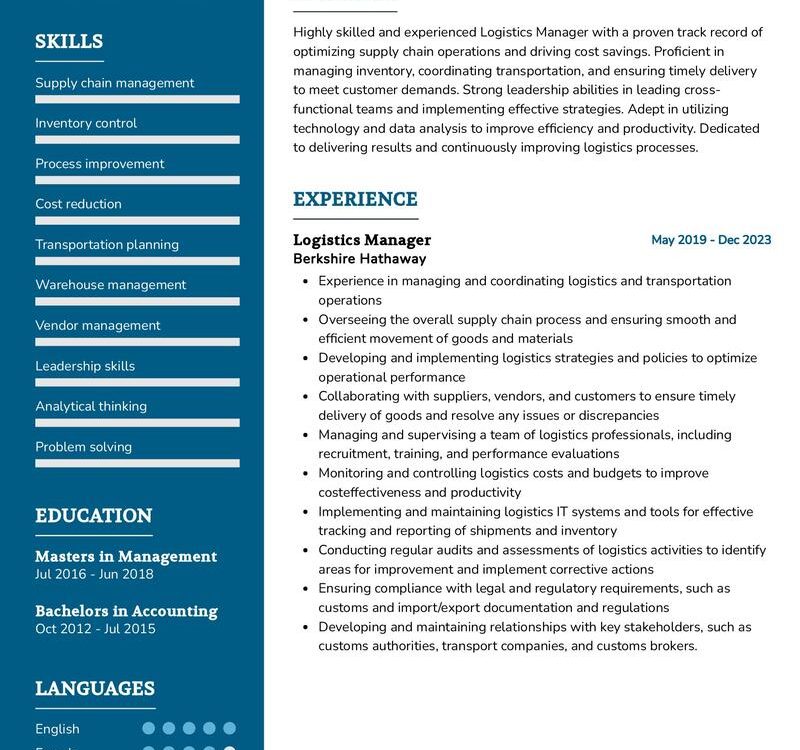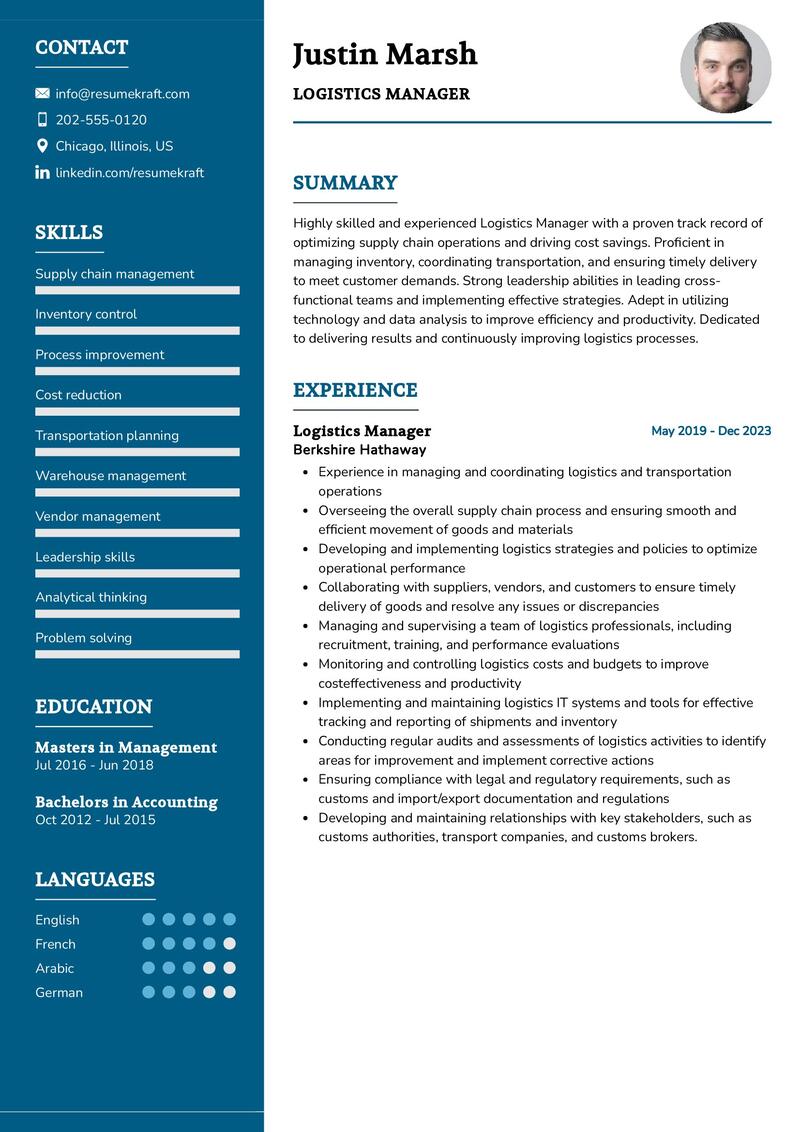Understanding the Role of a Logistics Manager
As the global economy continues to thrive, the role of a Logistics Manager has become increasingly vital in ensuring the smooth flow of goods and materials within organizations. A Logistics Manager plays a pivotal role in coordinating and optimizing the movement of goods, from production to distribution, ultimately contributing to the efficiency and profitability of the business. Let’s explore the multifaceted role of a Logistics Manager and the key responsibilities that come with it.
Job Requirements for Logistics Manager Position
Becoming a Logistics Manager requires a blend of education, experience, and specific skills tailored to the demands of the role. Below are the key requirements to step into the shoes of a Logistics Manager:
- A Bachelor’s degree in Supply Chain Management, Logistics, Business Administration, or a related field, providing a foundational understanding of logistics principles.
- Demonstrated experience in logistics operations, preferably in progressively responsible roles.
- Strong analytical skills and attention to detail to effectively manage inventory, transportation, and distribution processes.
- Proficiency in logistics software and systems, such as warehouse management systems (WMS) and enterprise resource planning (ERP) software.
- Excellent communication and interpersonal skills to liaise with suppliers, vendors, and internal stakeholders.
- Leadership abilities to motivate and manage logistics teams, fostering a collaborative and efficient work environment.
Additional certifications in supply chain management or logistics can enhance your qualifications and marketability in the field.
Responsibilities of a Logistics Manager
The role of a Logistics Manager encompasses various responsibilities aimed at optimizing the movement and storage of goods. Here are the key duties and responsibilities associated with this role:
- Planning and coordinating logistics operations, including inventory management, transportation, and warehousing, to ensure timely delivery of goods.
- Developing and implementing strategies to optimize logistics processes, minimize costs, and enhance efficiency.
- Managing relationships with suppliers and carriers to negotiate contracts, monitor performance, and resolve any issues that may arise.
- Utilizing logistics software and systems to track shipments, monitor inventory levels, and analyze data to make informed decisions.
- Ensuring compliance with regulatory requirements and safety standards in all logistics activities.
- Leading and mentoring logistics teams, providing guidance and support to achieve departmental goals and objectives.
Each responsibility plays a crucial role in ensuring the seamless flow of goods and materials within the organization, contributing to overall operational efficiency and customer satisfaction.
Writing an Effective Logistics Manager Resume
Your resume serves as a reflection of your skills, experience, and qualifications as a Logistics Manager. Here are some tips to craft an effective resume that showcases your expertise:
- Highlight your experience in logistics operations, emphasizing key accomplishments and contributions in previous roles.
- Quantify your achievements with specific metrics, such as cost savings, improved delivery times, or increased efficiency.
- Include relevant keywords and phrases related to logistics and supply chain management to optimize your resume for applicant tracking systems (ATS).
- Tailor your resume to the specific job description, emphasizing skills and experiences that align with the requirements of the position.
- Proofread your resume carefully to ensure it is free of errors and presents a professional image.
By following these tips, you can create a compelling resume that highlights your qualifications and increases your chances of landing the desired Logistics Manager role.
Key Skills for a Successful Logistics Manager
Successful Logistics Managers possess a unique blend of technical expertise, leadership abilities, and interpersonal skills. Here are the key skills and qualities that contribute to success in this role:
Technical Skills:
- Proficiency in logistics software and systems, such as WMS and ERP software.
- Strong analytical skills to analyze data and identify opportunities for improvement.
- Knowledge of transportation regulations and best practices in logistics management.
- Understanding of inventory management principles and techniques to optimize inventory levels.
Soft Skills:
- Effective communication skills to liaise with internal and external stakeholders.
- Leadership abilities to motivate and manage logistics teams.
- Problem-solving skills to address challenges and implement solutions.
- Time management and organizational skills to prioritize tasks and meet deadlines.
By honing these skills, you can excel in the role of a Logistics Manager and drive success in your organization.
Common Mistakes to Avoid in a Logistics Manager Resume
When crafting your Logistics Manager resume, it’s essential to avoid common mistakes that can diminish its effectiveness. Here are some pitfalls to steer clear of:
- Using generic language and clichés that fail to differentiate your resume from others.
- Focusing too much on duties rather than accomplishments, which may not effectively showcase your value as a candidate.
- Neglecting to customize your resume for each job application, missing an opportunity to highlight relevant skills and experiences.
- Overlooking the importance of formatting and layout, which can impact readability and make your resume less appealing to employers.
- Failing to proofread your resume for spelling and grammatical errors, which can detract from your professionalism.
Avoiding these mistakes can help ensure that your Logistics Manager resume stands out to potential employers and increases your chances of securing interviews.
Conclusion
As a Logistics Manager, you play a critical role in optimizing the flow of goods and materials within your organization, contributing to its overall efficiency and success. By leveraging your skills, experience, and qualifications, you can effectively coordinate logistics operations, minimize costs, and enhance customer satisfaction.
Remember to craft a compelling resume that highlights your achievements and showcases your value as a candidate. By following the tips outlined in this article, you can increase your chances of landing your dream Logistics Manager role and advancing your career in the field of supply chain management.
Finally, feel free to utilize resources like AI Resume Builder, Resume Design, Resume Samples, Resume Examples, Resume Skills, Resume Help, Resume Synonyms, and Job Responsibilities to create a standout application and prepare for the Logistics Manager job interview.


